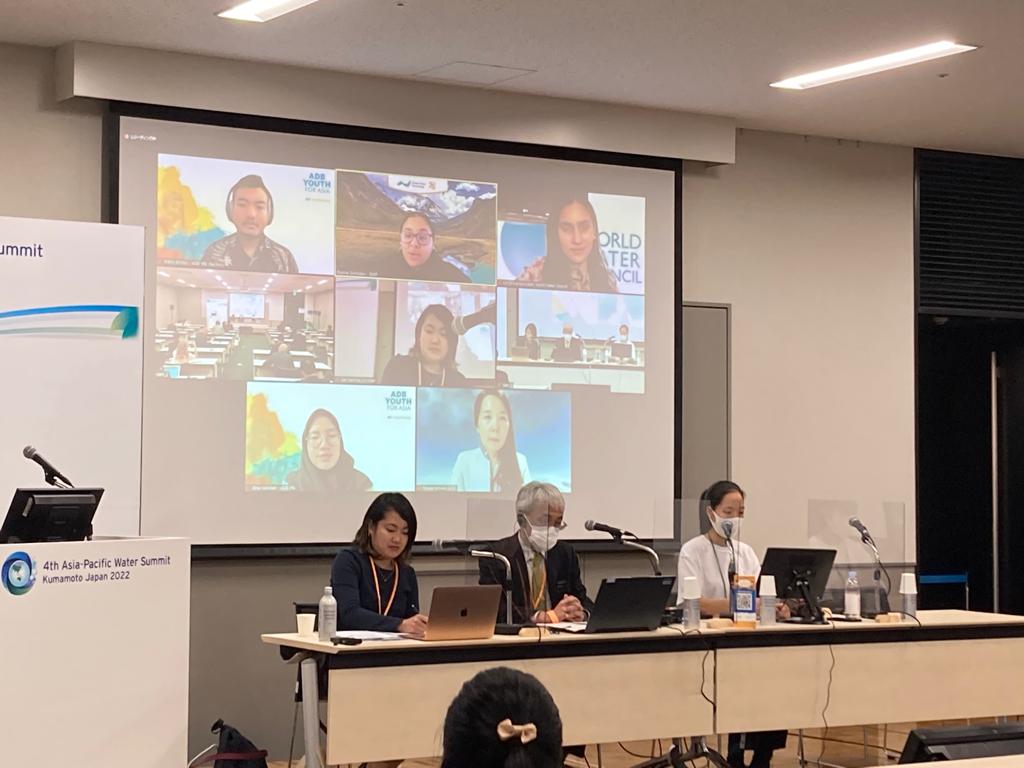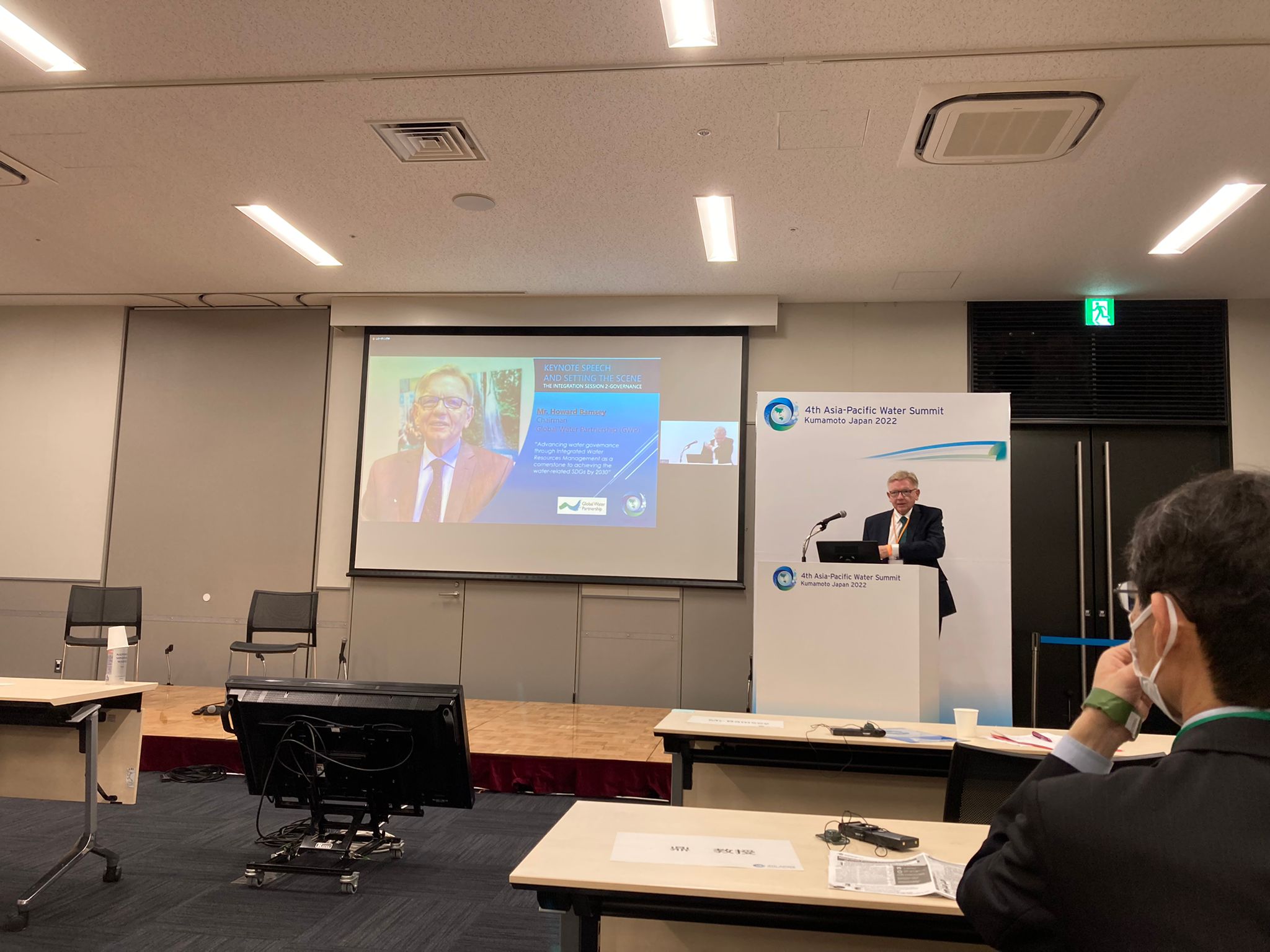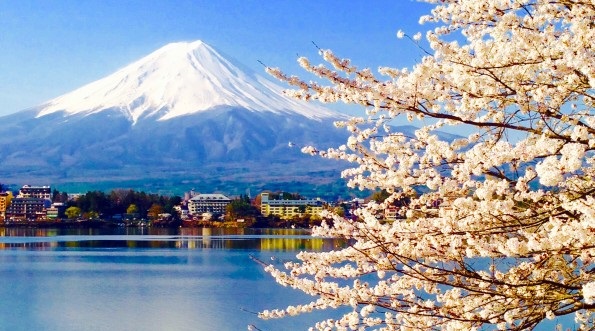Hosted by the Asia-Pacific Water Forum with intensive input from the Global Water Partnership (GWP), which co-organised six sessions, the fourth iteration of the APWS revolved around the theme ‘Water for Sustainable Development – Best Practices and the Next Generation’.
Several speakers, including the Emperor of Japan Naruhito, noted that the water sector is seriously off-track with respect to achieving water-related SDGs, and that the Covid-19 pandemic has rolled back previous advances. The urgency of the transformation required animated the sessions that followed.
Water links women, men, and youth, from source to sea
The event ‘Water and Environment from Source to Sea’, co-organised by GWP on the first day, provided a stellar example of how certain solutions might apply themselves to real-world challenges. The session was opened by Howard Bamsey, GWP Chair, followed by a keynote address by Peter Thomson, UN Special Envoy on Water, both of whom stressed the importance of fresh and marine water. The source to sea approach was included in the Summit's declaration.
The Yangtze Water Partnership MSP Project Group’s work on addressing plastic pollution was presented by Ying Li, and highlighted the need for cross-sectoral, upstream-downstream cooperation that connects freshwater to the seas. Strong messages on the importance of addressing the source to sea approach were reflected in the Summit Declaration, which could be a game changer for Asia Pacific governments that recognise the importance of coordinating fresh and marine water communities.
‘Water, Poverty/Gender’ was co-convened with Akiyuki Kawasaki of the University of Tokyo, bringing together researchers and development practitioners from several GWP regions and partner institutions. Keynote speaker Kusum Athukorala, GWP South Asia Regional Chair, challenged Summit participants to step up their game in view of the fast-approaching 2030 deadline to reach the SDG goals on gender and equality. Guljamal Nurmuhammedova, Regional Coordinator of GWP-CACENA, said that the promotion of gender equality in water management contributes to equity in education and career development for women. Rahmah Elfithri, Deputy Regional Coordinator of GWP-SEA, emphasised the key role of community level involvement to improve water management and cited the contribution of gender mainstreaming workshops in Southeast Asia. Overall, the session stressed the importance of political will to advance gender equality and reduce poverty; the need for gender analysis and integration of gender into biophysical research; and the use of scientific findings to ensure policies are gender responsive and socially inclusive.
At the session on ‘Water & Disaster/Climate Change’, GWP also put an emphasis on stakeholder inclusion. This applies to women, youth, and vulnerable communities particularly in times of water-related disaster. Stakeholder engagement heavily emphasized in another session co-convened by GWP, ‘Water, Culture, Peace’, about addressing transboundary water challenges.
‘Innovation by Youth’ continued with the theme of meaningful youth engagement and intergenerational partnership pathways for water security and resilience. Case studies from Sri Lanka, Japan, and Nepal were highlighted, and a thought-provoking panel discussion addressed the challenges faced by youth culturally and institutionally. Youth participants took the opportunity to address member states directly through a declaration, demanding that tokenistic inclusion be replaced with “positive attitudes toward working with young people as equal partners”.

Good governance can unlock finance
The special sessions from the first day flowed into the sessions on governance, finance, and science and technology, which are seen as critical to achieving the water-related SDG targets. GWP Chair Howard Bamsey, who delivered the keynote address on governance, characterised the water crisis as stemming from poor management. This can only be resolved through strong governance that takes a ‘systems approach’ and applies integrated water resources management (IWRM) to improve governance. During the panel discussion, Bibi Zarina binti Che Omar, Director General of the Department Irrigation and Drainage and Vice chair of GWP Malaysia, cited IWRM as key to achieving coherence between water sectors.
Furthermore, strong water governance can open doors: “We are now beginning to see,” Bamsey noted in a separate statement, “that countries and companies that have strong resilience plans – who say ‘we understand the real world of climate change, we understand the real impact of all these on our plans and are ready to deal with them’ – are finding it easier to get finance.” The link between governance and finance was reiterated by the Water Sector Lead of the Green Climate Fund, Amgad Elmahdi, who pointed out that integrity and good governance in climate change projects are the cornerstones of successful projects that use funds for their designated purposes and enable adaptation.

Towards quality growth and a water secure future for all
The keynote on governance also served to summarise the messages of the APWS and indicate avenues for action on water. Decrying “siloed approaches, fragmented thinking, lack of institutional capacity, and bureaucratic competition”, the GWP Chair called for efficient and accelerated action, enhanced water cooperation in transboundary basins, and multi-disciplinary approaches across public and private sectors, including women, youth, and local communities. He concluded:
“With only 8 years left to achieve the SDGs, now is the time to take this path, with the need for governments to commit to policy decisions and water governance frameworks that support the acceleration of actions towards resilient, inclusive, and sustainable societies in the Asia and the Pacific, with an emphasis on a green recovery from COVID-19 and quality growth in addressing water-related issues.”

